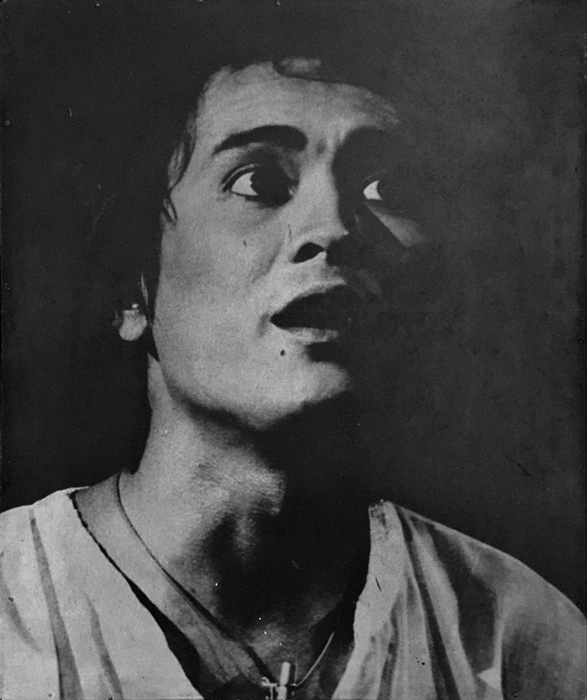Boy Camara Superstar
/Boy Camara singing Gethsemane in the 1985 repeat production of "Jesus Christ Superstar"
The baby was born to a Chinese grandfather, an immigrant named Wee. Wee’s Philippine sponsor was named Camara and by default, Wee became a Camara. The name carried on like a burning torch and on October 30, 1950, the boy who was born with a clerk in a hurry came to be known as “Baby Boy Camara.”
But wait, there’s more. On his baptismal certificate, his name was Ruperto. That was the name his parents wanted. But it wasn’t until he applied for a passport for the first time as an adult that he dealt with the clerical error and his birth certificate was corrected. However, by then, the world as we knew it had already come to know him as “Jesus Christ.”
Boy Camara – the collegian heartthrob with an angelic face and nasal voice – was arguably the most popular man on the University of the Philippines (UP) Diliman campus in the late ‘60s, early ‘70s. Rising from years as a vocalist for the iconic Chosen Few, he later sang with the Birth of the Cool and its spinoff, The Afterbirth. In 1971 he was chosen to star in the much celebrated Cultural Center of the Philippines (CCP) production of the hit musical Jesus Christ Superstar.
The Chosen Few (from Dodi Tan's album) : L-R: Boy Camara, Sonny Tolentino (decd.), Dodi Tan, Cash Manalang and Mon Laqui. Seated front: Kutu Manalang and Epoy Pangilinan, band manager (decd.)
He grew long beautiful hair. For three months he memorized and rehearsed all this lines and movements and became a character so credible as the lover of Mary Magdalene, the foe of Judas Iscariot and the enemy of Jews that only heathens dared not watch any of the 24 shows the musical ran on the big stage on Roxas Boulevard.
Jesus Christ, Jesus Christ
Who are you, what have you sacrificed?
Boy became the face of Jesus and his fans went agog. It was a hit so big that everyone expected his pockets to be lined as well as the lines of people that went to see him in the theater.
“Ha ha ha!” Boy laughed, “I did not make a peso from it!”
He was kidding, right? Well, no, not really.
It was the ‘70s and they had a generous producer that paid him P300 per show. That was a handsome amount considering his previous gigs with bands earned him only P20 a night for four sets of play. But as big a star as he was, everyone knew him and everyone wanted free tickets to his shows. And like Jesus, he charitably gave tickets away.
“It is very difficult to make money as a musician,” he sighed. “You can have a nice gig, be the star, but there will be times you don’t have work and money runs out. Lots of musicians die broke.”
He has been luckier than most. In 1972, Boy broke a thousand hearts by marrying his high school sweetheart Luisa Que who had just returned to the country after years of study in the US and Europe. He had missed her so much that when she arrived home in January, they were wed by May in the picturesque Paco Church in Manila.
Boy Camara today (Photo by Bella Bonner)
For a while during married life Boy continued singing with various bands and stayed up late and away from his wife and family. Night after night he sang until the excitement wore completely off. In his words, he felt like a jukebox.
I only want to say, if there is a way
Take this cup away from me
For I don’t want to taste its poison
Feel it burn me I have changed
One evening he was out with the boys in Quezon province and over a few beers they started singing. The first guy sang a song he had written about life in the province and it was beautiful, like a well-thought-out serenade. The second guy did the same, singing a song he had written and it rang true to form. By then Boy felt like crap. Here were guys with the least bit of sophistication and they could create excellent pieces of music. He, on the other hand, was a professional musician but he never did and probably never could write his own songs.
That was it; his passage was complete. He no longer wanted to be in the music scene.
He dabbled in real estate. He took to manufacturing brushes, building houses and operating bulldozers. He had a blast doing things that were so different from what he had been doing all his life. Surprisingly, each project and task that he completed gave him immense pride and a sense of accomplishment he rarely felt before. He loved the change he created for himself.
In 1977, Boy and wife Luisa flew to Poona or Pune in western India and stayed nearly half a year in spiritual enlightenment with Bhagwan Shree Rajneesh or Osho, the mystic who taught people how to meditate while doing something like walking, eating, whatever. One doesn’t have to just sit there and say Om…
Osho’s teachings had such a profound effect on the couple that when Luisa died – I repeat, when Luisa died – in 1992, Boy remained calm. Silent. And then he gave out one very loud scream.
Try not to get worried, try not to turn on to problems that upset you,
Oh don’t you know everything’s alright, yes everything’s fine
and we want you to sleep well tonight
Let the world turn without you tonight
Luisa’s illness was brief. She wasn’t feeling well one day; the next she was in coma. By the seventh day she was dead. She was only 41
After a year of grieving and singleness, it was time to consider having a new partner. This time, Boy Camara, the campus idol any coed would have loved to go out with a couple of decades ago, needed help. That’s when a friend of a friend told him about a group for single parents within the Christian organization called Bukas Loob. Here he met Bernadette Fernandez, a widow.
There probably were no sparks in the first meeting for it was another year before they dated but when they did, the relationship quickly led to marriage.
A Camara Wedding (Taken Nov 2014): Front L-R: Lia Perez-Pascual; Matt Pascual-Canlas; Uno Navarro-Camara. Middle Row: Jingle Perez-Pascual; Honey Pascual-Camara; Pearl Pascual-Canlas; Bernadette Pascual-Camara; Kris Tayag-Camara; Kosho Que-Camara; Boy Camara; Paolo Que-Camara; Dingdong Navarro-Camara. Back row: Nico Canlas; Max Canlas; Eumir Que Camara.
Bernadette had three children by her first husband; two girls and a boy. One of the girls, Honey, had completed college in Ateneo and an exchange program in Japan and was moving to the US for good. New York was an expensive place to live so she bunked in with Paolo in his three-bedroom apartment. Paolo is Boy’s son.
Well one day Boy and Bernadette were in a car with Paolo when he announced in a less than dramatic way, “Honey and I are in a relationship.”
The news was pretty startling because it was a his-son her-daughter kind of thing but the fact is, they were unrelated and yes, they had fallen in love and were getting married.
“Did you sense something was going on?” I asked Boy.
“Of course,” he laughed. “I was young once too.”
The parents gladly gave their blessing.
Marriage the second time around for Boy and Bernadette has settled in pretty nicely. There’s a house in BF Homes, Paranaque where they live and a house in Heroes Hill, Quezon City where they don’t, but it’s a nice one to keep. When I texted Boy Kam, the name by which he is now known, to set a date for lunch, he said he would be in Quezon City on Monday, like most days, to drop off and pick up a grandchild at school.
“Ah, apos-tolic duty!” my remark came fittingly.
He lives a life of contentment waking up mornings and meditating in motion, meaning he gets up and does tai chi. Softly, gently like the wind he moves with controlled breathing and awareness of nothing but the present moment.
With this much energy flowing through one’s senses, I wonder, who needs drugs? Not Boy. He was never one for abuse. In spite of the proliferation of hallucinogens in the ‘60s and ‘70s, he often shied away especially when performing. “I want to know what I’m doing on stage,” he said, “and I want to be able to project my voice to the audience.”
Oh that voice that reminds me of cold, rainy days. I went home, went on youtube and listened to him sing Elton John’s Love Song.
Love is the opening door
Love is what we came here for
No one could offer you more
Do you know what I mean
Love Song is his torch song but he cannot live down the fact that many of us know him best for his role as Jesus—a man so misunderstood, he was nailed to a cross. That’s not all bad. Osho, the guru Boy and his wife fell in love with in the ‘70s and the one he still calls “My Master” once said about Jesus:
“Jesus was not following anybody. He was not imitating anybody…It was better to die on the cross than to live as a hypocrite.”
Here are some Boy Camara songs from YouTube. Unfortunately, there was no recording of his Jesus Christ Superstar performances.
Bella Bonner, UP Mass Comm graduate, moved back to Manila after 30 years in Texas and is trying life as an urban farmer. Between growing arugula in her neighbor’s yard and making artisan cheeses, she contemplates on raising goats in her own yard. Would her neighbors agree?
More articles from Bella Bonner






